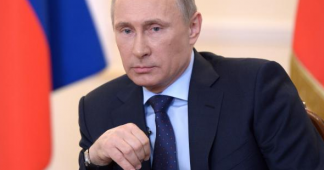16 April 2018
In the immediate aftermath of this weekend’s US-led missile attack on Syria, the preparations for a wider war that could trigger a nuclear catastrophe are being laid.
The recklessness of US policy has only increased. Hardly had the smoke cleared from the carnage left by more than 100 cruise missiles than the US ambassador to the United Nations, Nikki Haley, was boasting that the US remained “locked and loaded.” On the “Face the Nation” Sunday interview program, Haley said the US troops would remain in Syria and announced that the Trump administration would unveil new sanctions on Monday against Russian firms doing business with Damascus.
Russia countered by announcing that it was upgrading Syrian missile defenses.
Numerous media commentaries criticized the so-called “limited” attack by US, British and French naval and air forces as inadequate and demanded a more extensive and sustained military offensive. The New York Times quoted Republican Senator Lindsey Graham as saying, “I fear that when the dust settles, this strike will be seen as a weak military response and Assad will have paid a small price…”
The Washington Post in its lead editorial Sunday attacked Trump for again hinting at removing US troops from Syria. It pointed to the huge swath of territory in eastern Syria occupied by US troops and American proxy forces and demanded that Trump “further fortify” the US position on the ground in order to force the departure of Syrian Prime Minister Bashar al-Assad.
The New York Times’ David Sanger and Ben Hubbard in a front-page article Sunday argued against Pentagon claims that the strikes had seriously damaged Assad’s alleged chemical weapons program. They wrote: “While it is easy to blow up Mr. Assad’s chemical facilities, it is also relatively simple for him to reconstitute them elsewhere, or just turn to a commercially available substance like chlorine to make a poison that any nation is allowed to possess.”
The bases for new provocations and fresh pretexts for military aggression are already being laid. If not another staged chemical attack, the next casus belli for war could well be a terrorist attack or an assault on US troops in the Middle East attributed to Assad.
For more than 25 years the United States has been engaged in continual warfare, justifying each conflict with bogus claims of committed or imminent atrocities by the targeted country: “weapons of mass destruction” against Iraq, a looming massacre of civilians against Libya, and now gas attacks against Syria.
The media campaign in recent weeks against Russia and Syria over alleged poison attacks was an orchestrated operation to provide a suitable pretext for a military attack that was, in fact, planned months ago. The alleged Russian government poisoning of former double agent Sergei Skripal and his daughter was followed immediately by the media campaign over the supposed gas attack by the Assad regime on the town of Douma, and then held by US-backed Islamist militias fighting to overthrow the Iranian-and Russian-backed regime.
An utterly corrupt and dishonest Western media promoted the government claims without producing any evidence to substantiate them, while it barely noted the evidence produced by Russia and Syria exposing the claims as fraudulent. The attack launched over the weekend was not a response to a gas attack that allegedly occurred a week before. It was a highly coordinated joint strike involving missiles fired from US, French and British naval and air platforms in the Red Sea, the northern Persian Gulf and the Mediterranean. Such an action is not the result of a few days’ planning.
Now, in the aftermath, the international geopolitical situation and the internal political crises of the US and the European powers have only grown more explosive.
In the US, the preparations for a wider war in the Middle East and the political war against Trump waged by sections of the ruling class and the state have merged into a single process.
Defense Secretary James Mattis and the military brass decided to avoid a clash with Russia for now not only out of military considerations, but also political ones. Strikes and rebellions by teachers against the corporatist trade unions are continuing, and the political crisis in Washington is deepening. Sentiment against war is widespread in the working class. Under these conditions, the military has no confidence in Trump’s ability to oversee the actions abroad and at home it deems necessary to overthrow Assad and take on Russia.
The neoconservative pundit Max Boot explicitly connected a major expansion of the war in Syria with the removal of Trump in a Washington Post op-ed piece titled “Airstrikes amidst the scandals.” “Just as Bush had no Iraq plan in the spring of 2003, so today Trump has no Syria plan,” he wrote, adding, “If the United States had a parliamentary government, Congress could pass a motion of ‘no confidence,’ thus allowing Trump to devote 100 percent of his attention to fighting the multiplying charges against him without the distraction of running the government.”
The New York Times published an editorial written just prior to the missile strikes calling on Congress to pass a new authorization for the use of military force. This push for a new legal justification for war shows that the ruling class is preparing for a much more extensive military intervention. It knows that there will be growing opposition and wants to create a legal framework to criminalize antiwar dissent and ban antiwar speech.
In Europe as well, the missile strikes have intensified the internal political and social crisis as well as tensions with America. British Prime Minister Theresa May faces demands for a parliamentary debate on the Syrian attack, with polls showing broad antiwar sentiment and widespread skepticism toward the claims of a chemical attack by Assad. The air strikes have exacerbated popular anger against French President Emmanuel Macron, who faces a wave of rail strikes and escalating student protests.
In Germany, sections of the media are using the strikes, which Chancellor Angela Merkel supported but did not directly join, to demand the full-scale rearmament of Germany and a foreign policy less dependent on the US.
Indicative of the war fever gripping the German ruling class is a commentary published by Frankfurter Allgemeine Zeitung editor Berthold Kohler, who wrote: “The selfish child in the Oval Office forces Germany to finally grow up in regard to foreign policy. It will not happen so quickly that the German Navy gets aircraft carriers and the Luftwaffe cruise missiles. But the willingness of Germany to assume more responsibility in the world in the face of Trumpism…cannot be limited to applauding the French and the British… The fundamental contradiction of German foreign policy of having high moral and humanitarian standards, but only a low readiness to enforce them ‘robustly’ in an emergency, cannot be solved in any way with unarmed reconnaissance flights.”
It would be a fatal error to confuse the tactical decision by the US military to avoid for now a direct clash with Russian forces in Syria with a shift in the strategic orientation of American imperialism toward a wider war in Syria and a military confrontation with Iran and Russia. The circumscribed nature of this weekend’s strikes reflects the awareness within the American military of the potential consequences of any military attack in Syria.
There is no question that if Russian forces had been hit, the result could have been Russian retaliation. But it is only a matter of time before a future military attack triggers a direct conflict between the two largest nuclear powers in the world. Russian President Vladimir Putin himself warned Sunday that further Western attacks on Syria would inevitably lead to “chaos in international relations.”
Each such attack underscores how real and present is the danger of a massive war with catastrophic consequences. The world is witnessing an eruption of US and world imperialism that threatens to destroy human civilization. It can be prevented only by the revolutionary mobilization of the international working class to put an end to capitalism.
Barry Grey
Published at http://www.wsws.org/en/articles/2018/04/16/pers-a16.html











